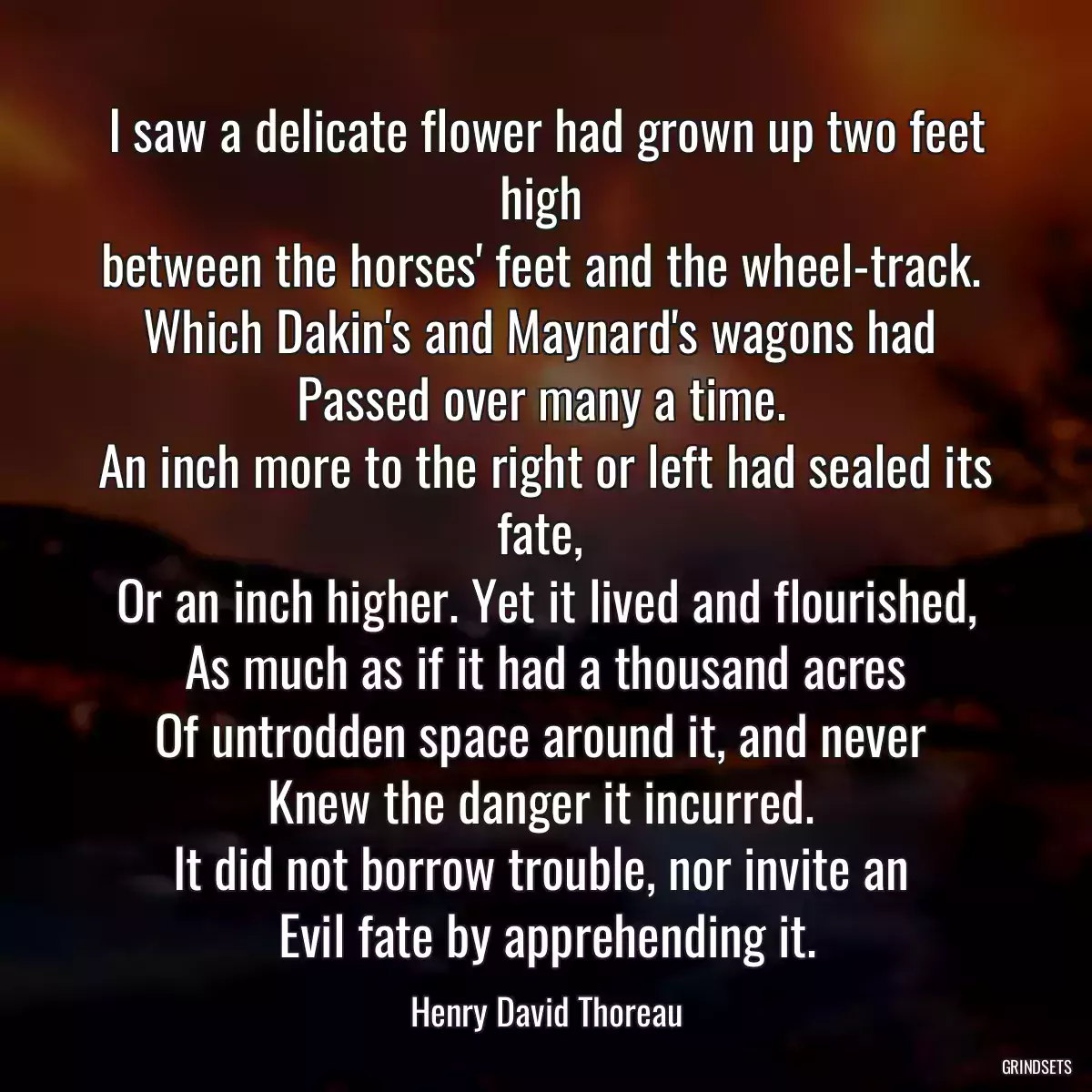
Quotes Henry David Thoreau - page 22
Find dozens of Henry David Thoreau with images to copy and share.

A true Friendship is as wise as it is tender. The parties to it yield implicitly to the guidance of their love, and know no otherlaw nor kindness.
For a companion, I require one who will make an equal demand on me with my own genius. Such a one will always be rightly tolerant.It is suicide, and corrupts good manners, to welcome any less than this. I value and trust those who love and praise my aspiration rather than my performance. If you would not stop to look at me, but look whither I am looking, and farther, then my education could not dispense with your company.
It is impossible to say all that we think, even to our truest Friend. We may bid him farewell forever sooner than complain, for our complaint is too well grounded to be uttered.
You may also like
We never exchange more than three words with a Friend in our lives on that level to which our thoughts and feelings almost habitually rise.
The books for young people say a great deal about the selection of Friends; it is because they really have nothing to say about Friends. They mean associates and confidants merely.
One may discover a new side to his most intimate friend when for the first time he hears him speak in public. He will be stranger to him as he is more familiar to the audience. The longest intimacy could not foretell how he would behave then
To say that a man is your Friend, means commonly no more than this, that he is not your enemy. Most contemplate only what would be the accidental and trifling advantages of Friendship, as that the Friend can assist in time of need by his substance, or his influence, or his counsel. Even the utmost goodwill and harmony and practical kindness are not sufficient for Friendship, for Friends do not live in harmony merely, as some say, but in melody.
There is danger that we lose sight of what our friend is absolutely, while considering what she is to us alone.

That excitement about Kossuth, consider how characteristic, but superficial, it was!--only another kind of politics or dancing. Men were making speeches to him all over the country, but each expressed only the thought, or the want of thought, of the multitude. No man stood on truth. They were merely banded together, as usual one leaning on another, and all together on nothing.
I am grateful for what I am and have. My thanksgiving is perpetual. It is surprising how contented one can be with nothing definite - only a sense of existence. Well, anything for variety.
Sweep away the clutter of things that complicate our lives.
I have just been through the process of killing a cistudo for the sake of science; but I cannot excuse myself for this murder, and see that such actions are inconsistent with the poetic perception, however they may serve science, and will affect the quality of my observations. I pray that I may walk more innocently and serenely through nature. No reasoning whatever reconciles me to this act. It affects my day injuriously. I have lost some self-respect. I have a murderer's experience to a degree.
Behave so the aroma of your actions may enhance the general sweetness of the atmosphere.
The poet will write for his peers alone. He will remember only that he saw truth and beauty from his position, and expect the time when a vision as broad shall overlook the same field as freely.
A friend is one who incessantly pays us the compliment of expecting from us all the virtues, and who can appreciate them in us. The friend asks no return but that his friend will religiously accept and wear and not disgrace his apotheosis of him. They cherish each other's hopes. They are kind to each other's dreams.
Is it the lumberman, then, who is the friend and lover of the pine, stands nearest to it, and understands its nature best? Is it the tanner who has barked it, or he who has boxed it for turpentine, whom posterity will fable to have been changed into a pine at last? No! no! it is the poet: he it is who makes the truest use of the pine-who does not fondle it with an axe, nor tickle it with a saw, nor stroke it with a plane. . . .
You may also like

I saw a delicate flower had grown up two feet high
between the horses' feet and the wheel-track.
Which Dakin's and Maynard's wagons had
Passed over many a time.
An inch more to the right or left had sealed its fate,
Or an inch higher. Yet it lived and flourished,
As much as if it had a thousand acres
Of untrodden space around it, and never
Knew the danger it incurred.
It did not borrow trouble, nor invite an
Evil fate by apprehending it.
Treat your friends for what you know them to be. Regard no surfaces. Consider not what they did, but what they intended.